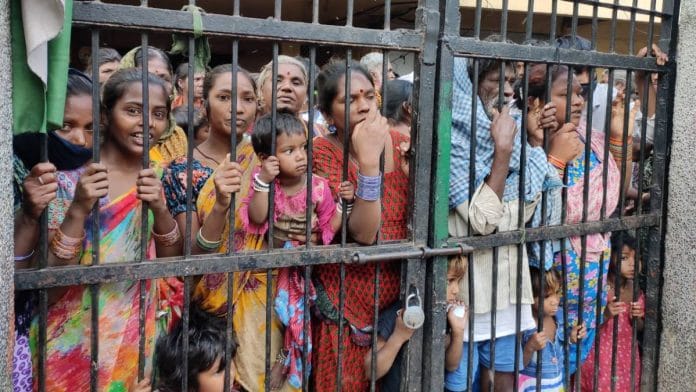New Delhi: In March-April 2021, soon after the Covid-19 pandemic struck, a survey of 124 countries found that only 39 per cent had access to family planning services, and 21 per cent of these countries reported a drop in access to child protection services for disabled children. Further, 24 per cent out of 61 countries reported a drop in response to calls for help against sexual violence during the pandemic.
The data is part of a policy brief the United Nations Children’s Emergency Fund (UNICEF) and the World Health Organization (WHO) have come out in coordination and other global health agencies, calling out to the world for action against the disproportionate effects of the Covid-19 pandemic on women, children and adolescents.
The policy brief — ‘Rise, Respond, Recover’ — seeks to bring a renewed focus on health conditions of women, children and adolescents during the pandemic.
Developed by UNICEF, WHO, PMNCH and the International Health Partnership for UHC 2030 (UHC2030), the brief was launched Tuesday on the sidelines of a meeting of the United Nations High-Level Political Forum (HLPF) for Sustainable Development.
It highlighted data that indicated how the pandemic had put in jeopardy the progress achieved in the past few years towards better health conditions for women, children and adolescents.
For example, according to the policy brief, a survey conducted by UNICEF in March-April 2021 found that only 39 per cent of the 124 countries surveyed had access to family planning services during the pandemic. The lack of access to family planning services could cause an additional 7 million unintended pregnancies worldwide, it noted.
Similarly, 21 per cent of the 124 countries reported a drop in access to child protection services for disabled children. When it came to response to calls for help against sexual violence, 24 per cent out of 61 countries surveyed reported a drop in response. According to the brief, there has been a 1/3rd reduction in progress towards ending gender-based violence owing to the pandemic and an additional 13 million child marriages have taken place.
The Tuesday event was hosted by the Government of Estonia and co-organised by the Partnership for Maternal, Newborn & Child Health (PMNCH, a global alliance for women’s, children’s and adolescents’ health and well-being), UNICEF, UNFPA, WHO and the International Health Partnership for Universal Health Coverage, 2030.
Developed in support of the Global Strategy for Women’s, Children’s and Adolescents’ Health, the policy brief is an update to the Protect the Progress: 2020 report authored by UNICEF and WHO.
According to the UNICEF survey referred to in the policy brief, 41 per cent of the 92 countries surveyed reported disruptions in the management of moderate to severe malnutrition.
The policy document observed that mother-to-child transmission of HIV could increase by 1.6 times and more than 2 lakh additional stillbirths were expected over the next year, due to the disruptions caused in emergency care services.
It was noted that while 119 women, for every 100 men, currently live in extreme poverty, the ratio will likely worsen by 2030 and 121 women for every 100 men will live in extreme poverty. The policy document noted that South Asian women will be particularly affected.
The policy brief also touched upon the disruptions caused by the pandemic in education. Citing a World Bank survey, the brief noted that all schools in 19 countries were shut as on 30 June 2021. In 56 other countries, educational institutions were closed in either some parts of the country or for students studying in certain classes.
Also read: Can pandemic recovery put world on path to SDGs? Next 18 months key, says UN report
Problems and the way forward
The ‘call to action’ highlighted key problem areas and offered solutions to meet the 2030 Sustainable Development Goals (a collection of global goals), progress towards which has been derailed by the pandemic, according to the HLPF.
The brief focussed on seven goals, including protecting access to health services, improving gender equality and access to sexual and reproductive health and rights, improving quality care, supporting and protecting health care workers, ensuring stronger social safety nets, clean water, sanitation and prevention of violence.
The policy document called upon countries to be more transparent and robust about data collection.
In a panel discussion, as part of the virtual event Tuesday, Kersti Kaljulaid, President of Estonia and Global Advocate for the UN’s Every Woman Every Child global strategy, too emphasised on the importance of data collection and urged governments to be more supportive for it. “Governments should promise never to use information provided by people against them. Otherwise, they will stop providing this data,” she said.
The policy document also called upon governments to expand access and improve the availability of digital health services and telemedicine for women, children and adolescents.
Borge Brende, president of the World Economic Forum, said during the event countries across the world have since the beginning of the pandemic innovated and made good use of telemedicine, which can be a game-changer in access to healthcare.
Barring procedures that need a patient to be physically present, many consultations can be taken online in a safe manner. This democratises access to healthcare, he said.
At the same time, the policy brief cautioned countries on the negative health impact of an increasingly digitised world as children are now more vulnerable to advertising and marketing techniques that could exploit their ‘developmental vulnerability’.
(Edited by Poulomi Banerjee)
Also read: Covid pandemic — Netherlands cases rise by over 500%, global interest in Tokyo Olympics muted






